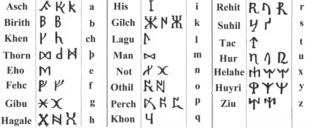Rabanus Maurus
Rabanus Maurus Magnentius (c. 780 – 4 February 856), also known as Hrabanus or Rhabanus, was a Frankish Benedictine monk, theologian, poet, encyclopedist and military writer who became archbishop of Mainz in East Francia.[2][3] Returning to Fulda, in 803 he was entrusted with the principal charge of the abbey school,[3] which under his direction became one of the most preeminent centers of scholarship and book production in Europe, and sent forth such pupils as Walafrid Strabo, Servatus Lupus of Ferrières, and Otfrid of Weissenburg.[2] He handled this position efficiently and successfully, but in 842 he resigned so as to have greater leisure for study and prayer, retiring to the neighbouring monastery of St Petersberg.[6] Rabanus' works, many of which as of 1911[update] remained unpublished, comprise commentaries on scripture (Genesis to Judges, Ruth, Kings, Chronicles, Judith, Esther, Canticles, Proverbs, Wisdom, Sirach, Jeremiah, Lamentations, Ezekiel, Maccabees, Matthew, the Epistles of St Paul, including Hebrews); and various treatises relating to doctrinal and practical subjects, including more than one series of homilies.In De institutione clericorum he brought into prominence the views of Augustine and Gregory the Great as to the training which was requisite for a right discharge of the clerical function.A commentary, Super Porphyrium, printed by Cousin in 1836 among the Ouvrages inédits d'Abélard, and assigned both by that editor and by Haurau to Hrabantis Maurus, is now generally believed to have been the work of a disciple.Highlights of the celebrations included the display of Codex Vaticanus Reginensis latinus 124, an extremely rare loan by the Vatican to Mainz of a spectacular manuscript containing De laudibus sanctae crucis.


WinkelRoman Catholic ChurchAlcuinFrankishBenedictinearchbishop of MainzEast FranciaCarolingianMartyrologium RomanumAbbey of FuldaRatgarof HalberstadtBenedictSaint MaurusWalafrid StraboServatus Lupus of FerrièresOtfrid of WeissenburgPriscianAlban ButlerPalestineJoshuaOrigenSt PetersbergVeni Creator SpiritusHoly SpiritPentecostGustav Mahlereighth symphonySaint Michael and All AngelsarchangelsGabrielRaphaelThe Hymnal 1982Episcopal ChurchRalph Vaughan WilliamsBiblioteca Medicea LaurenzianaGenesisJudgesChroniclesJudithEstherCanticlesProverbsWisdomSirachJeremiahLamentationsEzekielMaccabeesMatthewEpistles of St PaulHebrewshomiliesIsidore of SevilletypologicalHebrewDe re militariCousinMarcomannicElder FutharkAnglo-Saxon runesCarolingian EmpireAlemanniaBavariaMarcomanniWilhelm GrimmPatrologiae cursus completusCorpus ChristianorumJ. McCullohCatholic University of America Presspublic domainChisholm, HughEncyclopædia BritannicaThe Heroic AgeGrimm, WilliamCatholic EncyclopediaMigne, Jacques PaulBrepols PublishersWikisourceAnn BlythGerman National LibraryDeutsche Digitale BibliothekCharlesHistory of Catholic theologyKey figuresHistory of the Catholic ChurchTimelineHistory of the papacyPapal primacyEcumenical councilsCatholic BibleVulgateBiblical canonHistory of Christian theologyEarly ChurchClement of RomeFirst Epistle of ClementDidacheIgnatius of AntiochPolycarpEpistle of BarnabasThe Shepherd of HermasAristides of AthensJustin MartyrEpistle to DiognetusIrenaeusMontanismTertullianAntipope NovatianCyprianConstantinePope Gregory IEusebiusAthanasius of AlexandriaArianismPelagianismNestorianismMonophysitismEphrem the SyrianHilary of PoitiersCyril of JerusalemBasil of CaesareaGregory of NazianzusGregory of NyssaAmbroseJohn Chrysostom